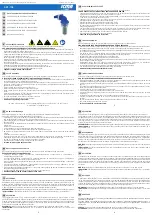
89
Using the Listening Modes
—Continued
Notes:
*1
For 7ch output, output can be switched between Front high or Front wide speakers by pressing the [SP LAYOUT] button (depending on the
“Speaker Configuration” setting (see page 95)).
*2
For 9ch output, output can be switched between the combination of Surround back and Front high, or Surround back and Front wide
speakers by pressing the [SP LAYOUT] button.
*3
Based on the audio channels contained in the source, the corresponding speakers will output the sound.
*4
• This listening mode can be selected only when all the following conditions are satisfied:
a.
Center speaker is connected to the AV receiver.
b.
Either of Front High speakers or Front Wide speakers is connected to the AV receiver.
• Output can be switched between Front high or Front wide speakers by pressing the [SP LAYOUT] button (depending on the “Speaker
Configuration” setting (see page 95)).
*5
This listening mode is not available while you are using Zone 2 (“Not Available” will appear on the display). If you turn Zone 2 on during
the Pure Audio listening mode, the listening mode will change to Direct.
*6
If there are no surround back speakers, DTS is used.
• Available sampling rate for PCM input signal is 32/44.1/48/88.2/96/176.4/192kHz.
• The listening modes cannot be selected with some source formats.
The AV receiver’s listening modes can transform your
listening room into a movie theater or concert hall, with
high fidelity and stunning surround sound.
Pure Audio
In this mode, the display and video circuitry are turned
off, minimizing possible noise sources for the ultimate in
high-fidelity reproduction. (As the video circuitry is
turned off, only video signals input through HDMI IN
can be output.)
Direct
In this mode, audio from the input source is output
directly with minimal processing, providing high-fidel-
ity reproduction. All of the source’s audio channels are
output as they are.
Stereo
Sound is output by the front left and right speakers and
subwoofer.
Mono
Use this mode when watching an old movie with a mono
soundtrack, or use it with the foreign language
soundtracks recorded in the left and right channels of
some movies. It can also be used with DVDs or other
sources containing multiplexed audio, such as karaoke
DVDs.
Multichannel
This mode is for use with PCM multichannel sources.
Dolby Pro Logic IIx
Dolby Pro Logic II
Dolby Pro Logic IIx
expands any 2-channel source for
7.1-channel playback. It provides a very natural and
seamless surround-sound experience that fully envelops
the listener. As well as music and movies, video games
can also benefit from the dramatic spatial effects and
vivid imaging. If you’re not using any surround back
speakers,
Dolby Pro Logic II
will be used instead of
Dolby Pro Logic IIx.
• Dolby PLIIx Movie
Use this mode with any stereo or Dolby Surround
(Pro Logic) movie (e.g., TV, DVD, VHS).
• Dolby PLIIx Music
Use this mode with any stereo or Dolby Surround
(Pro Logic) music source (e.g., CD, radio, cassette,
TV, VHS, DVD).
• Dolby PLIIx Game
Use this mode with video games, especially those
that bear the Dolby Pro Logic II logo.
Dolby Pro Logic IIz Height
Dolby Pro Logic IIz Height
is designed to more effec-
tively use existing program material when height chan-
nel speaker outputs are present.
Dolby Pro Logic IIz
Height
can be used to upmix a variety of sources from
movies and music, but are particularly well-suited to
upmix game content.
Dolby Digital
Use this mode with DVDs that bear the Dolby Digital
logo, and Dolby Digital TV broadcasts. This is the most
common digital surround-sound format, and it’ll put you
right in the middle of the action, just like being in a
movie theater or concert hall.
Audyssey Dynamic Surround Expansion™
Audyssey Dynamic Surround Expansion™ is a scalable
system that adds new speakers to improve surround
impression. Starting with a 5.1 system Dynamic Sur-
round Expansion first adds Wide channels for the biggest
impact on envelopment. Research in human hearing has
proven that information from the Wide channels is much
more critical in the presentation of a realistic soundstage
than then Back Surround channels found in traditional
7.1 systems. Dynamic Surround Expansion then creates
a pair of Height channels to reproduce the next most
important acoustical and perceptual cues. In addition to
these new Wide and Height channels, Dynamic Sur-
round Expansion applies Surround Envelopment Pro-
cessing to enhance the blend between the front and
surround channels.
About the Listening Modes
















































